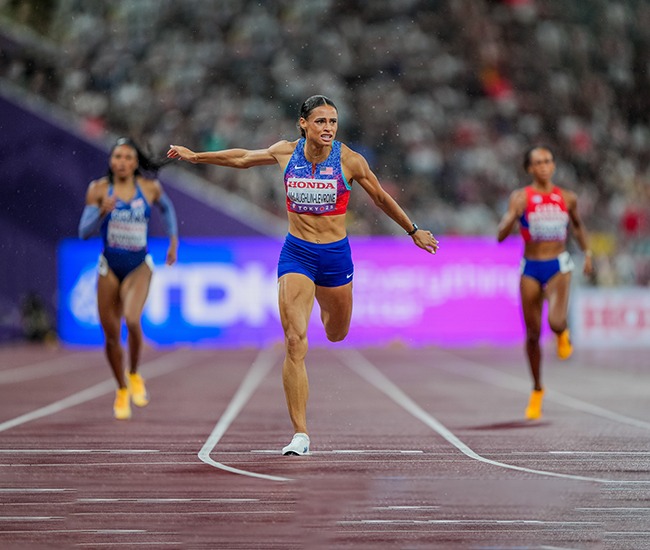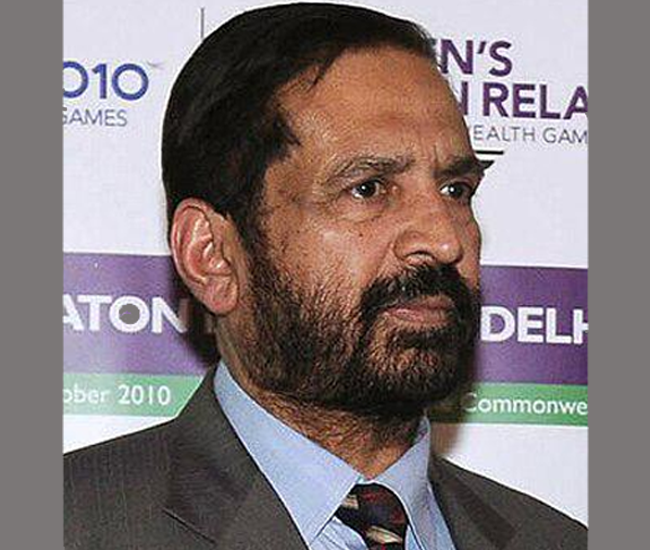
Day 6 - McLaughlin-Levrone Clocks 47.78s, Obliterates World Championship Record in Tokyo
Photo Credit: Dan Vernon for World Athletics
By A Correspondent
In a race widely perceived to be of world-record-breaking potential, Sydney McLaughlin-Levrone clocks second fastest 400m timing, that of 47.78 seconds that obliterated the championship record in the World athletics championships in Tokyo on Thursday.
For four decades, Marita Koch’s world record of 47.60s had defied all-comers. It was time and again pointed out and also commented upon as one of the toughest world records to beat. Yet, the way McLaughlin-Levrone timed 48.29s for a national record yesterday, prompted experts to suggest that the world record might be broken in the final.
Who else to break it than Sydney-McLaughlin. But she had a battle on her hands with world and Olympic champion Marileidy Paulino of the Dominican Republic in ominous form and Bahrain’s Salwa Eid Naser, the gold medallist from 2019, with championships record of 48.14s, in no mood to give up. The American scotched all speculation over the first 200m itself. From then on it was only a matter of what her timing would be at the tape.
Czech Jarmila Kratochvlova with 47.99s was the number two on the all-time lists, a time that silver winner Paulino also bettered on Thursday with a 47.98s. Naser’s bronze came in 48.19s, a season best.
"I knew there were a lot of people doubting me with making the switch from 400m hurdles to the flat 400m, but ultimately, I had faith in my training. I knew I had it in me," McLaughlin-Levrone said. "It definitely helped having Marileidy Paulino in the outer lane where I could see her. But I still had to get the work done.” It was a cooler climate compared to previous days following showers and the weather seemed to have helped all the athletes.
A new champion emerged in men’s 400m, too, as Busang Collen Kebinatshipi brought home the first gold for Botswana in a World championship. Bayapa Ndori, the better rated Botswanian till the other day, added one more medal to his country as he took the bronze behind Trinidad and Tobago’s Jereem Richards, in a season best 44.20s. Richards, the silver medallist also last time clocked a national record of 43.72s. "This is my first title and it feels crazy," said Kebinatshipi. "After the semifinal I really started to believe in myself. I told myself to go out fast and do better.”
"Being able to run the national record and a world lead is fantastic”, said Kebinatshipi who was one of the three Botswanians in the final. The third was Lee Bhekempilo Eppie who finished eighth and last in 44.70s. Botswana will thus be strong in the men’s 4x400m relay also.
It was a day when the whole of Asia must have looked up to two of its champions in the men’s javelin, defending champion Neeraj Chopra of India and the Olympic champion, Arshad Nadeem of Pakistan, fail to win a medal in javelin. As it turned out in a final that couldn’t come up expectations, Asia finished outside the medals bracket with Chopra ending up eighth, a rung below Sri Lankan Rumesh Tharanga of Sri Lanka, and Nadeem coming in at tenth. Keshorn Walcott of Trinidad and Tobago, the 2012 Olympic champion, added another global title to his collection.
These were unexpected setbacks for Asia in an event in which had shown its dominant having seven men in the field including four Indians. Out of the four, young Sachin Yadav made a most memorable debut finishing fourth with a personal best 86.27m. Tharanga had 84.38m, Chopra had 84.03m and Nadeem 82.75m. Two-time World champion of Grenada was the silver winner with 87.38m. Compared to the qualification round, almost every competitor was down on their performance in the final.
“I have been waiting for this medal for 13 years,” said Walcott. “Olympic victory at the age of 19 was incredible. I could never beat it. I have been fighting for a World Championships medal, but I was always off the podium. “
Walcott said changing his coach was the best decision he took this year. He revealed that Chopra’s former coach Kalus Bartonietz was now his coach.
Chopra, obviously disappointed that he could not bring out his best in a global championship for the first time after his success in the Tokyo Olympics said that he has had some problems before coming over for these championships but he had not talked about them in the run-up.
The Indian had fallen on delivery on his last throw, the fifth, in the final and clutched his groin region, grimacing. Only the top six go through for the sixth round as per the new format. German Julian Weber, a strong contender for the title this time, having had two results over 91 metres, finished fifth with 86.11m. He tried to hide his disappointment as he watched the top six battle it out in the last round.
In a rousing women’s triple jump final, Leyanis Perez Hernandes of Cuba overcame stiff competition from Thea Lafond of Dominica and four-time World champion Yulimar Rojas of Venezuela. The 23-year-old Cuban, who had won the title at this year’s World Indoor championships and taken the bronze in the Worlds in 2023, was comfortably placed after a third-round jump of 14.90m but eventually wrapped up the title with a final round jump of 14.94m, a world lead.
Thea Lafond of Dominica, 2024 Olympic champion, came second just five centimetres behind, producing 14.89m in the final round. Rojas meanwhile saw her opening jump of 14.76m being matched by Lafond on the second round and though she fought gamely till the end there was no denying either Hernandez or Lafond.
In women’s 5000m heats, 10,000m champion Beatrice Chebet and Faith Kipyegon, 1500m champion, both from Kenya, kept themselves on course for double clocking 14:45.59 and 14:56.71 for first and second in two different heats. Gudaf Tsegay of Ethiopia, world champion in 10,000 in the last edition won the other heat.
In the men’s 200m semi-finals, 400m world record holder Wayde van Niekerk of South Africa was knocked out, ending with 20.12s in fourth place in heat that was won by American Kenny Bednarek, a strong contender for a medal in the event. A bigger contender for the gold after his disappointment in not getting the short dash was Noah Lyles who won a heat in a world-leading 19.51s.
Comments are closed.


